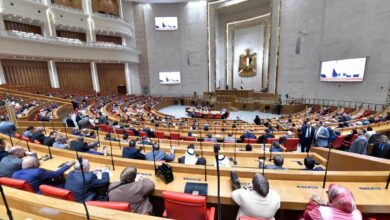Speculations about the new cabinet take up substantial space on the front pages of today’s newspapers. New ministers are expected to be announced within hours, Al-Ahram says. The state-owned daily adds that six ministers will be fired, including Sameh Fahmi, oil minister; Mufid Shehab, minister for legal affairs; Aisha Abdel Hadi, minister of manpower; Samiha Fawzi, minister of trade and industry; Ali al-Moselhi, minister of social solidarity; and Hani Helal, minister of higher education. Most of these ministers served in former President Hosni Mubarak’s cabinets and are deemed unacceptable by many segments in Egyptian society.
Yet two unpopular figures might stay in office: Prime Minister Ahmed Shafiq and Foreign Minister Ahmed Abul Gheit. Before he resigned, Mubarak reshuffled his cabinet and appointed Shafiq, the former aviation minister, as prime minister. The cabinet overhaul was intended to contain public outrage; however, it fell short of convincing protesters to give up their primary demand that Mubarak step down.
During the early days of the uprising, Shafiq proved to be another disappointment. His belittling of the revolution and his personal ties with Mubarak provoked revolutionaries. Some youth-led groups have called for a protest on Tuesday to pressure the armed forces to sack Shafiq.
For the first time, the new cabinet may include ministers from opposition parties. Al-Akhbar reports that Mounir Fakhri Abdel Nour, secretary-general of the liberal Wafd party, will be entrusted with tourism, while prominent left-wing economist Gouda Abdel Khaleq, from the Tagammu party, may replace al-Moselhi at the Ministry of Social Solidarity.
Yet it seems that the nomination of Abdel Nour, a businessman, has hit a sensitive nerve with politicians who opposed Mubarak’s policy of appointing businessmen as ministers. It proved a recipe for corruption due to conflicts of interest. In his final cabinet reshuffle, Mubarak sacked five unpopular businessmen who held ministerial posts. Recently some of these businessmen were accused of using their positions to boost their private enterprises. Al-Dostour quotes former parlimentarian Alaa Abdel Moneim as saying that Abdel Nour's inclusion in the new cabinet will sanctify the same old policy that encouraged corruption.
On another front, Al-Ahram leads with updates from the legal commission in charge of amending the Constitution. The paper quotes Tarek al-Beshri, the commission’s head, as saying that constitutional articles granting the president broad powers will be modified. Al-Beshri adds that the commission will also amend legislation that regulates the exercise of political rights and parliamentary elections. For decades, these laws have acted as a draconian impediment to pluralism. “The commission is keen to make these amendments compatible with the democratic opening that the country is headed toward,” al-Beshri says.
As for presidential hopefuls, Al-Shorouk quotes Mohamed ElBaradei as saying that he may still run for president if the people want him. Last year, the Nobel prize laureate came to the fore as a figure for the opposition to rally around after he announced his willingness to run for president if the Constitution is amended. Now, as the legal commission is set to ease eligibility conditions, the Constitution is expected to open the door for many candidates. The paper goes on to quote ElBaradei commenting on the upcoming cabinet reshuffle: “The way to gain people’s trust and to prove credibility is to announce a new cabinet that includes a new prime minister and none of the ministers who served in the former president’s cabinet.”
Meanwhile, the paper also features on its front page gossip-style updates from Tora jail where politicians from the old regime have been languishing for the last few days. The paper reports that notorious former Interior Minister Habib Al-Ady refuses to leave his cell, which is protected by a number of policemen for fear that other prisoners might attack him. As for steel tycoon Ahmed Ezz, he continues to reiterate that he possesses documents that prove his innocence. Ezz refuses to eat prison food and only eats food brought by his visitors. Former Tourism Minster Zoheir Garana and former Housing Minister Ahmed al-Maghrabi also receive food from outside, adds the paper. The defendants were arrested last week and are being questioned on charges related to corruption and money laundering.
The political unrest that has swept the region in the wake of the Egyptian revolution is paid a similar amount of attention throughout the Egyptian press. The front page of Al-Shorouk newspaper bears a headline reading: “Arab outrage is expanding… And news about a massacre in Libya.” The paper dedicates a full inside page to developments in Libya, Bahrain and Yemen. These countries have been rocked by violent clashes between oppressive security apparatuses and thousands of protesters who call for change along the lines of Egypt’s.
Egypt's papers:
Al-Ahram: Daily, state-run, largest distribution in Egypt
Al-Akhbar: Daily, state-run, second to Al-Ahram in institutional size
Al-Gomhorriya: Daily, state-run
Rose al-Youssef: Daily, state-run, close to the National Democratic Party's Policies Secretariat
Al-Dostour: Daily, privately owned
Al-Shorouk: Daily, privately owned
Al-Wafd: Daily, published by the liberal Wafd Party
Al-Arabi: Weekly, published by the Arab Nasserist party
Youm7: Weekly, privately owned
Sawt al-Umma: Weekly, privately owned



